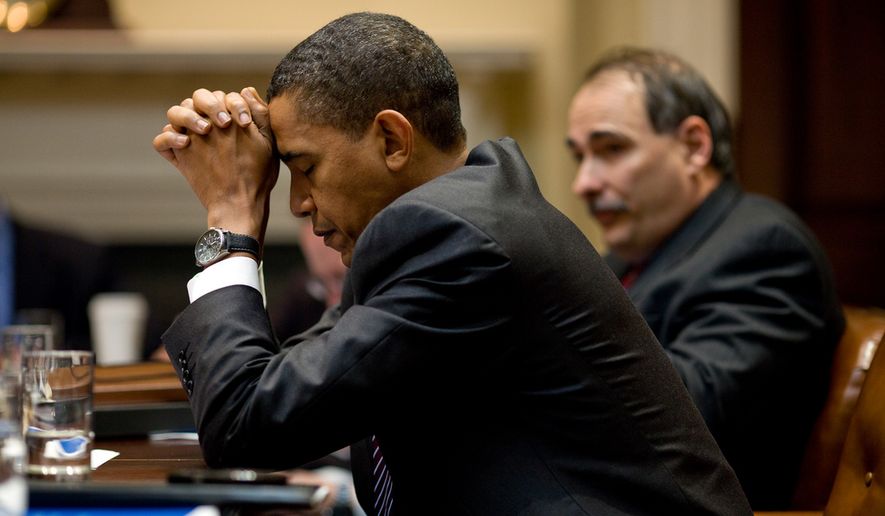Republicans are putting President Obama’s foreign policy on the ballot this year, and with the GOP poised to make big gains, including possibly capturing control of the Senate, the White House will see more constraints on its policies toward Ukraine, Iran and the Islamic State terrorists.
Some analysts predict a GOP-led Senate would join the House in a joint committee to investigate the 2012 Benghazi terrorist attack. Votes to beef up military spending and a comprehensive debate over policy toward Syria and the Islamic State are also likely in the upper chamber.
But the most likely place for Mr. Obama to face pressure is over Iran, where Democrats and Republicans have pushed for votes on tougher sanctions, countering the president’s own move to try to strike an international deal on Iran’s nuclear program. Senate Majority Leader Harry Reid has avoided holding a vote that could potentially embarrass Mr. Obama, but if the GOP controls the chamber, such a vote is likely, a senior Republican aide said.
Clifford D. May, president of the Foundation for Defense of Democracies, agreed that’s a likely outcome of a shift in power.
“Congress does not want an Iran deal that gives the regime both sanctions relief and leaves it a nuclear threshold power,” said Mr. May, who writes a regular column for The Washington Times. “But it’s apparent that President Obama does not plan to ask for congressional approval for whatever agreement he concludes with Iran’s rulers over their nuclear weapons program.”
Much of the focus on international relations would be on Sen. Bob Corker, the current ranking Republican on the Foreign Relations Committee. Mr. Corker declined to comment for this story.
SEE ALSO: Obama will bypass Congress on Iran sanctions if nuclear deal is reached
On the campaign trail, Republicans seeking election this year have cast the Obama administration as clueless on foreign policy, hammering him for embracing defense cuts, accusing him of complacency in the face of the Islamic State and incompetency in responding to the Ebola outbreak.
Polls show voters are losing confidence in the administration’s approach to global affairs.
An Associated Press-GFK survey released this week found that likely voters, by a 22 percentage point margin, trust Republicans more than Democrats to protect the country. It also showed that 60 percent disapprove of the way that Mr. Obama is handling the U.S. role in world affairs, and 58 percent disapprove of the way he is handling the threat posed by Islamic State terrorists.
The GOP is fielding several military veterans in key races — Rep. Tom Cotton in Arkansas, Dan Sullivan in Alaska and state Sen. Joni Ernst in Iowa — who are well positioned to win Democrat-held seats, and who analyst predict will likely line up with defense hawks like Sen. John McCain of Arizona and Lindsey Graham of South Carolina.
“When you get a Tom Cotton taking a really hard-line stand on ISIS but also saying Mexican drug lords are in cahoots with terrorists who want to come into Arkansas — that suggests we are not dealing with an isolationist,” said Norman J. Ornstein of the American Enterprise Institute, using an acronym for the terrorist organization. “Most of them will come in and be more inclined to the McCain view of the world than the [Kentucky Sen.] Rand Paul view of the world.”
Mr. Ornstein said the good news for Mr. Obama is that he could have an easier time passing trade agreements.
SEE ALSO: Obama strategy, legal authority for Islamic State offensive in question
Christopher A. Preble, vice president for defense and foreign policy studies at the Cato Institute, a libertarian-leaning think tank, said he is surprised that Republicans are pushing foreign policy in Senate races because “it is not their strong suit.”
“The GOP is still closely associated with the Iraq war, and that war remains very unpopular — even more so, if that’s possible — given that the central object of the so-called ’surge’ of building a durable Iraqi state that could defend itself and represent the interest of the Iraqi people obviously never materialized,” he said.
K.T. McFarland, who served as deputy assistant secretary of defense for public affairs under President Reagan, said Republicans also have some differences of their own to sort out, including over military spending, the use of force in global hot spots and balancing protecting civil liberties with national security needs.
“To a certain extent these are the same arguments we saw in the late 1970s between fiscal hawks and national security hawks,” Mrs. McFarland said. “But this time the discussion is likely to be more important. In [the] late 1970s the only threat we had was from [the] USSR. Today it is from radical jihad, terrorists, cyber, economic [and the] Chinese and Russian expansion.”
She said she expects the debate between what’s become known as the McCain wing of the party and the Rand Paul side will intensify as the GOP begins to search for a 2016 presidential nominee. “There are real differences between serious people,” she said.
• Seth McLaughlin can be reached at smclaughlin@washingtontimes.com.




Please read our comment policy before commenting.